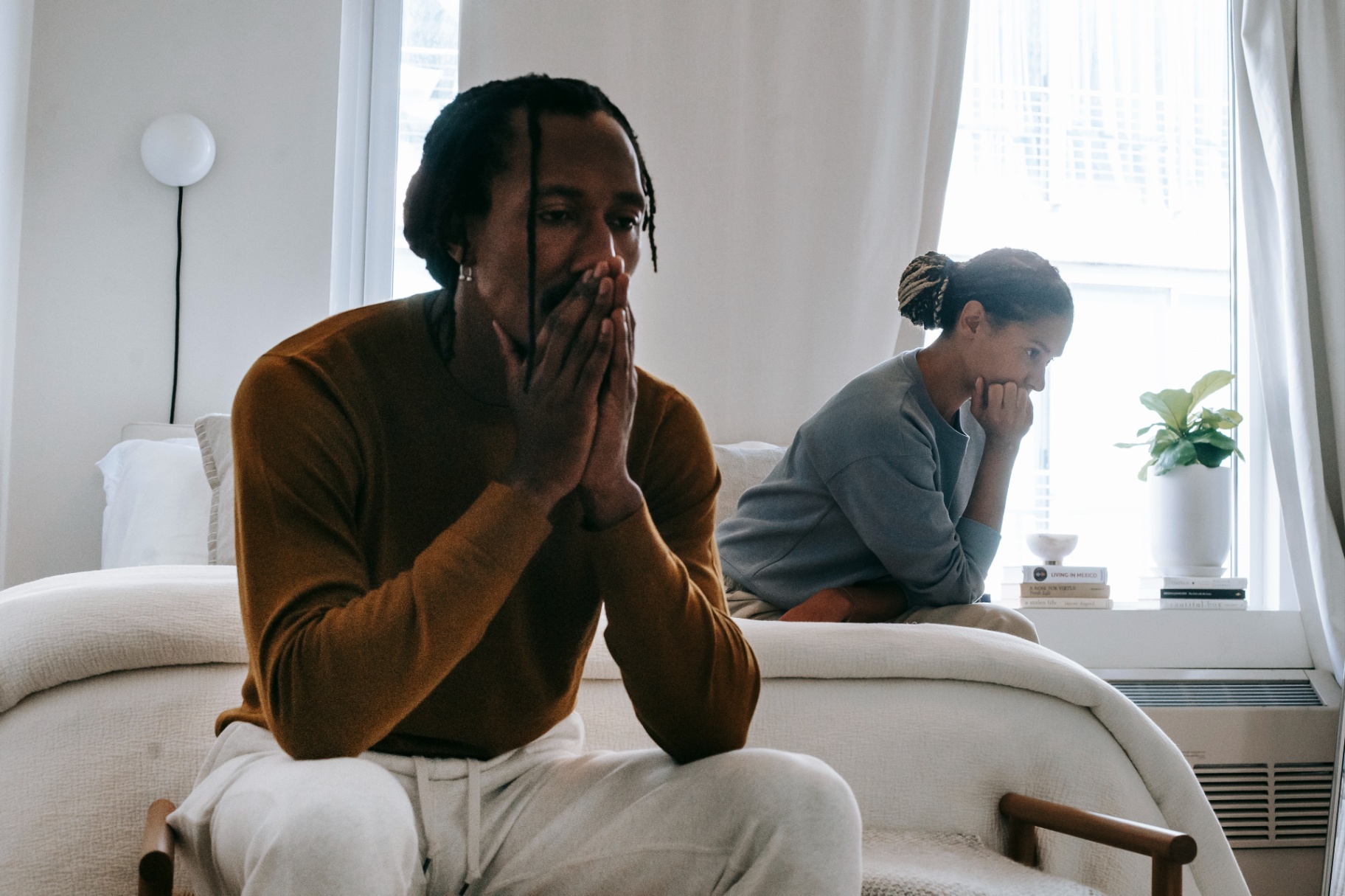Living in Separate Worlds: How Each Partner Can Have Such a Different Experience of the Relationship

When I first started doing couples counseling I noticed something completely baffling, and it took me a few years to figure it out. Again and again, a couple would come into our first session, I’d ask what was going on in the relationship, and would get a reply like this:
Her: I’m on my last leg. I don’t even know if I can do this counseling to be honest, things have been so bad for so long.
Him: Other than how unhappy she seems to be, I think things are going great.
These were not isolated incidents, they happened fairly often in one form or another. I remember thinking two things:
- How can two people in one relationship, living under the same roof, have such radically different perceptions of how things are going between them?
- Great. We’re three minutes into the session and I’m stuck already. What on earth do I do here?
With experience and practice, I eventually discovered answers to both questions and have used them to guide my work ever since, with good results.
This drastic difference in perceptions about whether things were going well is explained, in my mind, by partners being wired in different ways when it comes to two things:
- Presence of conflict vs absence of connection
- The need to connect through companionship vs the need to connect through conversation
Presence of conflict vs absence of connection
If you ask most men, “How are things going between you and your wife/partner?” they will think for a moment, mentally scan over the last few days, and think, “Let’s see, have we had a big fight lately? If we did, is she ‘over it’ yet? Did she smile when she got up this morning?” If there is a relative absence of conflict, or if there has been recent conflict but she seemed to be “over it” this morning, he’ll probably answer, “Things are pretty good.”
Ask his wife/partner the same question and she will do a mental scan as well, but not for conflict. Instead, she will search for the presence of emotional connection. She’ll think, “Have we really talked recently? When he hurt my feelings and I told him, did he take it seriously or did he get defensive? Do I feel like he has my back when I need to depend on him for emotional support?” If the answer to several of those questions is no, she will say, “Things are not good,” whether there has been recent conflict or not. She’s looking for emotional connection.
If he’s looking for conflict and there isn’t any, he’s happy and thinks things are pretty good. After all, how bad could things be if she seemed pleasant this morning?
But if she’s looking for emotional connection and can’t find it, she’s not happy even if conflict is rare in the relationship.
This important difference puts couples on a potentially dangerous path because she can be unhappy, lonely, and unsatisfied while he remains fairly clueless about the depth of her unhappiness.
He might say, “What do you mean you’re really unhappy? Just this morning you smiled at me and kissed me before I left for work, how can you be unhappy?”
She will frequently answer, “I’ve told you so many times I’m not happy, that I feel distant from you, that we aren’t really part of each others’ lives–but I’m trying to make the best of it. I’m not going to walk around being a b**** to you 24/7 just to show how unhappy I am.”
So that’s the first way partners are often living in completely different worlds. For him, absence of conflict indicates things are good, but for her it’s presence of emotional connection.
Let’s now look at the second issue, the fact that each partner is often seeking connection in a very different way.
Connection through companionship vs connection through conversation
Connection through companionship
Partners are often wired to have fundamentally different needs and expectations about connection. When he marries her, he looks forward to connecting through companionship and doing things together. Setting up a home. Raising children. Eating meals together. Having sex. Watching television. Perhaps going to sporting events. Attending the kids’ concerts and games together.
These are events, things couples do together, and one partner–nearly always the man (but not always)–feels connected to his partner through them. The partner who connects through conversation often does not understand that some people really connect through companionship and, because it’s not the way they connect, and may assume the companionship-seeking partner simply doesn’t need connection.
That is why he is often hurt that she attended sports events with him and/or hunted or fished or snowmobiled with him before the marriage, but has no interest in doing those things now. She sees those things simply as recreational activities that may have to take a back seat once the kids come along. But for him, those types of things are what have always made him feel connected to her. It means something to him and he misses it, but may find when he brings it up to his partner, she either blows it off or perhaps even accuses him of being irresponsible and not prioritizing the family.
Connection through conversation (about feelings)
She usually isn’t wired the way he is. She likely enjoys doing things together, but what she really craves, what really makes her feel deeply connected to him, is conversation. Not just any conversation, but conversation about personal experiences of reality, also called emotions or feelings.
No amount of activities or events will satisfy her need to connect to him through conversation about feelings.
When she commits to him, she believes they will connect fairly regularly in this way. After all, when they were dating they had these kinds of conversations. How are you feeling about this relationship? What’s really happening here between us? Is this a date? Are we exclusive? She looks forward to having someone in her life, under her roof, who will listen to her, encourage her, express understanding and empathy when she’s hurting or angry, and have her back emotionally.
Men often work very hard to do this at the beginning of a relationship, just as women often prioritize attending events and doing things with him.
The person who connects through conversation often doesn’t realize how valuable events, including many seemingly mundane events of life really are to her partner . The person who connects through companionship often doesn’t realize that the relationship hinges largely on continued efforts to be emotionally available to her.
Companionship needs are often met by default
Here’s where it gets really interesting. Many of the companionship-seeking partner’s needs for companionship are met naturally through the daily experience of couple and family life. He wakes up next to her every day and goes to bed next to her every night. They raise the kids together, attend their soccer games together, have sex together, celebrate holidays together, buy a home together, furnish that home together, travel and take vacations together. Oftentimes in a relationship, the companionship-seeking partner feels they are living the dream. Life is great. For the most part, he is content, maybe even quite happy.
But she’s not.
Conversations-about-feelings needs are not met by default
It’s not that she doesn’t like doing the stuff of life together, it’s that as all those things are happening that ring his bell and meet his companionship needs, she’s dying inside for lack of emotional connection. She feels like his roommate or business partner. When she has tried asking him to talk to her about feelings and “real” things, he often responds defensively, like she is attacking him and implying she doesn’t enjoy or appreciate all they do together which, in his mind, is what is supposed to make her happy.
So she’s feeling disconnected, tells him so and asks for more emotional connection, and then he feels like a failure because she’s not happy.
He gets fed up (and sends her to therapy)
At some point he tires of her bringing up her unhappiness every few days. At some point he may suggest she see a therapist to work through whatever it is that’s making her so unhappy, not realizing that usually the person she actually needs and wants to talk to is him.
She gives up. He now thinks she’s happy. The relationship is in danger.
Whether or not she goes to therapy, she may give up, and stop bringing up her unhappiness. He then often believes she has finally seen the light, pulled out of her funk, and realized what a great life they have and thinks now she’s happy.
What he doesn’t know is this may be the most dangerous position the relationship has ever been in. She has stopped asking for her basic needs to be met.
Final thoughts
I often meet a couple at the point where she is unhappy because there hasn’t been connection through conversation, and he’s fairly happy because there has been pretty steady companionship and she didn’t seem upset about anything this morning! In this article I have tried to help you understand what I’ve learned about how couples can be living in such drastically different realities.
Please note, as I have mentioned, the connection-seeking partner is not always the female. About 15%-20% of the time, it’s the male. It doesn’t make any difference because the problem ends up being the same. You can take nearly everything I’ve written here, swap the pronouns, and it’ll still fit just fine. I am not picking on men here, just trying to explain how the companionship-seeking partner, whether male or female, will need to get more intentional about helping the other partner feel connected. Even though many companionship needs get met in the course of everyday life, if the companionship-seeking partner is feeling disconnected and needs to spend more time together doing things, the conversation-seeking partner will need to take that seriously and make whatever efforts are required to meet those needs.
Questions: Does any of this remind you of your own relationship? If so, what do you need to do to make sure you are connecting with your partner in the way they need you to? How can you and your partner get on the same page with what’s happening in your relationship?
Check out my video on this topic
